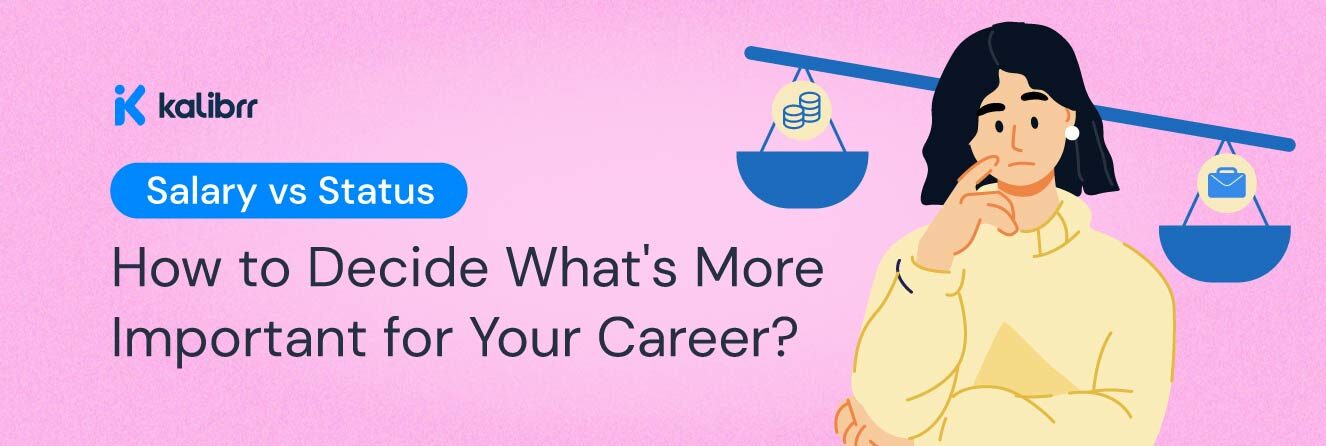Salary vs. Status: How to Decide What’s More Important for Your Career?

Whether you are a new job seeker or have been working for years, your career decisions help determine your next steps and where you want it to go. Making the right choice is important because it can have a significant impact on your work life as well as your long-term goals. Your career can greatly influence your professional network, reputation, and social status.
Today, we will be discussing a great debate that many, if not all, experience every time they take on a new position. Which is more important? Having a high-paying job or a high position at work. Decisions like these have to be carefully considered, and the options must always be weighed. Don’t worry, because through this blog, we want to help you figure out which one matters most to you, and if you’re still not sure, this can still apply to you!
TOPICS
Defining Salary and Status
Your salary and status can both play important roles in making career decisions. Despite being two different concepts, having to decide which one is more vital to your career can be quite tricky.
Salary is defined as the monetary compensation that an employee receives from their employer in exchange for the work or services provided. Typically, there is a fixed amount that is paid on a regular basis, depending on the company’s payment scheme. Salary is important because it provides workers with a source of income to be able to provide for their individual and family needs. In addition, the amount of salary that one receives can be an indicator of your contribution or position in the organization.
On the other hand, status refers to an individual’s position or rank in a social or professional setting. This can be influenced by various factors such as education, experience, industry, or job title. Your status can affect how you are perceived by others, including your clients, colleagues, and employers. Status can also provide you with a sense of personal fulfillment because it can be a reflection of your own dedication, hard work, and expertise.
Which one should I prioritize?
Deciding which one to prioritize between salary and status can be draining, here are the advantages and disadvantages depending on what you choose between the two!
Choosing Salary?
The first advantage of choosing a salary is that it can allow for financial stability because it gives you financial security as well, allowing you to meet basic needs and invest in personal development. With this comes personal growth because having enough resources can allow you to pursue additional education, obtain certifications, and attend training that can enhance your skills and lead to new job opportunities or a promotion. The last advantage is that you can have increased bargaining power when it comes to negotiating job offers and compensation packages.
With these advantages, choosing a salary can also have disadvantages. First can be job dissatisfaction because prioritizing salary over other factors that can affect your work life can lead to dissatisfaction and burnout, which can impact your job performance. Limited job opportunities may also be considered because they limit the jobs you want to apply to, as higher-paying jobs can be more competitive to get. Following up on the last disadvantage, there can be reduced job security because job seekers will rather pursue jobs that offer higher pay but less job security.
Choosing Status?
If you are someone who considers that your status is more important, an advantage to this is getting personal recognition and respect from your peers and colleagues. There can also be increased opportunities when you have high status, as well as access to more influential networks. Status can also provide a sense of personal fulfillment and achievement, especially when you are recognized for the contributions and expertise you have shared with the company.
A disadvantage of choosing status over other factors like work-life balance is experiencing burnout and reduced job satisfaction. Limited financial compensation can also be considered because a higher-status position may not necessarily mean that it is also high-paying. Increased pressure and stress can also be a con to choosing status, as people who have higher positions are expected to perform better than their peers.
At the end of the day, it is important to weigh the pros and cons of choosing between salary and status. Make informed decisions based on individual priorities and circumstances, as your career depends on them.
Factors to consider in making your decision
Before you finalize your decision, here are some factors you can consider:
- Personal values – Make sure to consider what is important to you as an individual when it comes to both your career and personal life. Align your decision with your personal values and other factors that can affect what you choose.
- Job market – Consider the current job market and the availability of jobs in your field that offer both a high salary and status. Analyze the job market and the opportunities available, and this is when you can decide which factor is important to you depending on the available job offers.
- Work-life balance – Think of how your decision between salary and status can affect your work-life balance. Think of which one will require the most time and effort, and if you are willing to possibly have to sacrifice certain aspects in order to achieve your goals. Ask yourself first, and make your decision based on what you value more.
- Job satisfaction – Prioritizing salary or status can have an impact on your job satisfaction and the quality of your day-to-day life. Weigh whether you would be happier in a job that offered a high salary or higher status. Also consider if the satisfaction you are receiving is impacted by other factors, such as job responsibilities and the work environment.
Overall, your decision on whether to prioritize salary or status is a personal one and will depend on individual circumstances, goals, and values.
Still can’t decide?
If you can’t decide which one to choose, don’t fret because you are not alone! We’re also here to give you tips on how to balance your salary and status.
First, rather than choosing one over the other with your current position, you can negotiate for a higher salary. Do research on salaries for your industry and position, and use what you’ve collected to ask for that raise based on your experience and qualifications.
Building a strong personal brand and pursuing career growth opportunities can help you look for a job that offers great pay and benefits for the position you are eyeing. It makes you valuable to your employers and can lead to more opportunities for your career.
You can also consider non-traditional work arrangements such as freelancing or doing consulting work for companies. Some employers offer higher pay with great flexibility in your schedule. This will also allow you to keep yourself occupied while looking for a job to pursue that you think works best for you.
It’s important to take the time to evaluate your personal career goals and values before making any decisions about your career path. Remember that your career is a long-term commitment, and whatever decision you make should always be in your best interest. In summary, taking the time to evaluate your personal career goals and values is an important step in finding a fulfilling career that provides financial stability and personal fulfillment.
–
Kalibrr is a recruitment technology company that aims to transform how candidates find jobs and how companies hire talent. Placing the candidate experience at the center of everything it does, we continue to attract the best talent from all over, with more than 6 million professionals and counting. Kalibrr ultimately connects these talents to companies in search of their next generation of leaders.
The only end-to-end recruitment solutions provider in Southeast Asia, Kalibrr is headquartered in Makati, Philippines, with offices in San Francisco, California, and Jakarta, Indonesia. Established in 2012, it has served over 18,000 clients and is backed by some of the world’s most powerful start-up incubators and venture capitalists. These include Y Combinator, Omidyar Network, Patamar Capital, Wavemaker Partners, and Kickstart Ventures.
For more tips on acing job interviews, follow Kalibrr on Facebook, Instagram, LinkedIn, and Tiktok.






Belum ada komentar yang tersedia!